What is Airport Staff?
Airport staff are individuals who work at the airport to ensure daily operations run smoothly and efficiently. They are responsible for various tasks related to passenger service, security, and flight operations. Below are some of the main roles of airport staff:
- Check-in and Boarding Staff:
- Task: Assist passengers in the check-in process, ensure baggage is checked in correctly, provide boarding passes, and guide passengers to the departure gate.
- Skills: Good communication skills, knowledge of flight procedures, and customer service skills.
- Ground Handling Crew:
- Task: Handling baggage, cargo, and equipment on board, including loading and unloading goods, and ensuring that baggage reaches the plane or baggage claim area safely.
- Skills: Physical strength, coordination skills, and knowledge of baggage handling equipment.
- Airport Security Staff:
- Task: Carry out security checks on passengers and baggage, operate an X-ray machine, and ensure that no dangerous goods enter the plane.
- Skills: Attention to detail, communication skills, and training in security procedures.
- Information and Customer Service Staff:
- Task: Provides information about flight schedules, airport map, and other services, and handle passenger complaints and requests.
- Skills: Communication skills, interpersonal skills, and knowledge of airport facilities.
- Maintenance and Engineering Officer:
- Task: Maintain and repair airport facilities and equipment, like a runway, terminal, and baggage handling systems.
- Skills: Technical expertise in a specific field, problem solving skill, and knowledge of safety standards.
- Immigration and Customs Staff:
- Task: Check travel documents such as passports and visas, and inspect goods entering and leaving the country to ensure compliance with customs regulations.
- Skills: Knowledge of immigration and customs regulations, analytical skills, and communication skills.
- ATC officer (Air Traffic Control):
- Task: Manage and monitor aircraft movements in the air and on the ground, provides instructions to pilots to ensure flight safety and efficiency.
- Skills: Ability to communicate clearly and effectively, high concentration, and the ability to work under pressure.
Each role within the airport staff has unique responsibilities and requires specific skills to ensure that airport operations run safely, efficient, and provide the best service for passengers.
Physical Requirements to Become Airport Staff
Becoming an airport employee requires meeting several general requirements that include education, Skills, and, in some cases, special physical or certification requirements. Here is an overview of the requirements to become an airport staffer:
1. Education and Qualifications
- Minimum Education: Most airport staff positions require a minimum of a high school graduate or equivalent. For more technical or specialist positions, such as air traffic control officers (ATC) or maintenance technician, usually requires higher education, such as a diploma or bachelor's degree in a related field.
- Certification: Some positions may require special certifications. For example, Airport security officers may need certification in aviation security procedures, while technicians may require engineering certification from a recognized institution.
2. Skills and Experience
- Communication Skills: Good communication skills are essential, especially for positions that interact directly with passengers, such as check-in staff and customer service.
- Customer Service Skills: Experience in a customer service or public-facing role is highly valued.
- Foreign Language Skills: Foreign language skills, especially English, often a plus because the airport serves international passengers.
- Technical Skills: For technical positions, such as maintenance technicians or ATC officers, Technical skills and a strong understanding of equipment and related procedures are essential.
3. Physical and Health Requirements
- General Health: Good health is required for most positions. Some positions may require periodic medical examinations.
- Physical Endurance: Positions such as ground handling crew require physical strength to lift and move baggage and cargo.
- Good Vision and Hearing: Multiple positions, such as security officers and ATC, requires good eyesight and hearing.
4. Background and Security Checks
- Background Check: Prospective airport staff often have to undergo background checks to ensure they do not have criminal records that could threaten aviation security.
- Security Check: Additional screening may be required for positions that have access to restricted areas or that involve airport security.
5. Training and Orientation
- Internal Training: Upon receipt, Airport staff usually undergo internal training to understand operational procedures, safety, and customer service specific to the airports where they work.
- Advanced Training: Ongoing training may be required to stay updated with new procedures and technology used at the airport.
6. Additional Requirements
- Minimum Age: Some positions may have a minimum age requirement, for example 18 or 21 year, depending on job responsibilities and local regulations.
- Ability to Work in a Team: The ability to work in a team and collaborate with various departments at the airport is essential to ensure smooth and efficient operations.
Becoming an airport staff requires a combination of education, Skills, health, and the ability to work in a dynamic and often busy environment. Each position may have additional specific requirements that prospective applicants need to meet.
Preparation Before Becoming Airport Staff
Preparing to become an airport employee involves several important steps to ensure you meet the requirements and are ready to perform your duties well. Here is a step-by-step guide on how to prepare:
1. education and training
- Complete Education: Make sure you have at least a high school diploma or equivalent. Consider pursuing additional education in a relevant field, such as aviation management, hospitality, or technique (for technical positions).
- Take Training or Courses: Look for courses or training offered by aviation training agencies or airports. For example, customer service course, aviation security, or baggage handling.
- Certification: Obtain any certifications that may be required for the position you want, such as aviation safety certification or maintenance technician licensing.
2. Work experience
- Get Relevant Experience: Experience in customer service, security, or technical positions would be invaluable. Working in a hotel, restaurant, or other public service positions can help develop the necessary skills.
- Intern or Volunteer: Consider interning or volunteering at an airport or airline to gain hands-on experience and insight into airport operations.
3. Skills
- Communication Skills: Develop good communication skills, both verbally and written. This is very important for interacting with passengers and co-workers.
- Foreign Language Skills: Foreign language skills, especially English, very appreciated. Consider taking a language course if needed.
- Technical Skills: For technical positions, ensure you have the relevant technical knowledge and skills. Learn about the equipment and procedures you will use.
4. Physical and Health Preparation
- Physical Health: Make sure you are in good health. Some positions require physical strength and endurance.
- Medical examination: Be prepared to undergo a medical examination if necessary, especially for positions such as ground handling or security.
- Fitness: Maintain physical fitness with regular exercise and a healthy diet.
5. Background and Security Checks
- Prepare Documents: Make sure you have all the necessary documents, such as personal identification, degree, certification, and work references.
- Perform a Background Check: Be prepared for strict background and security checks. Make sure you have a clean record and that there are no legal issues that could get in your way.
7. Training and Orientation
- Take Initial Training: Upon receipt, You will probably undergo training and orientation at the airport. This includes operational procedures, safety, and customer service.
- Learn the SOPs (Standard Operating Procedures): Familiarize yourself with standard operational procedures that will guide your work.
With good preparation, You will have a greater chance of success in the recruitment process and be able to carry out your duties as airport staff effectively.
Best Airport Staff School
Airport staff schools are educational or training institutions that provide specialized programs to prepare individuals to work in various positions at airports. One of the recommendations for the best airport staff school is FAAST Aviation. FAAST Aviation is a flight attendant education and training institution, flight attendant, airport and hotel staff.

Why choose FAAST Aviation as a place of education?
- FAAST Aviation has been accredited by LA-LPK. Not only that, FAAST Flight has also been registered with the Ministry of Manpower of the Republic of Indonesia and also has official permission from the Manpower Service of Sleman Regency, Yogyakarta.
- The educational material at FAAST Aviation is tailored to the needs of airlines. This will enable students to compete in the world of work.
- Not just education and training. But, Mental and personality will also be formed through this school. This will produce graduates who are ready to work.
- After completing your education at FAAST Aviation, you will still be assisted in finding work.
- Enjoy the “FLIGHT EXPERIENCE” Activity. You will get the experience of flying from Jogja to Bali and vice versa to see firsthand the work process at the airport.
FAAST Aviation airport staff school is located in Yogyakarta City. Currently the FAAST Aviation school is opening registration for new students. For prospective students who come from outside the city of Yogyakarta, there is no need to worry, because registration is available online.
FAAST Aviation School registration information, You can contact the registration admin : Sister Melia 0857-7272-7722
Read Also : Do you have to be slim to be a flight attendant?

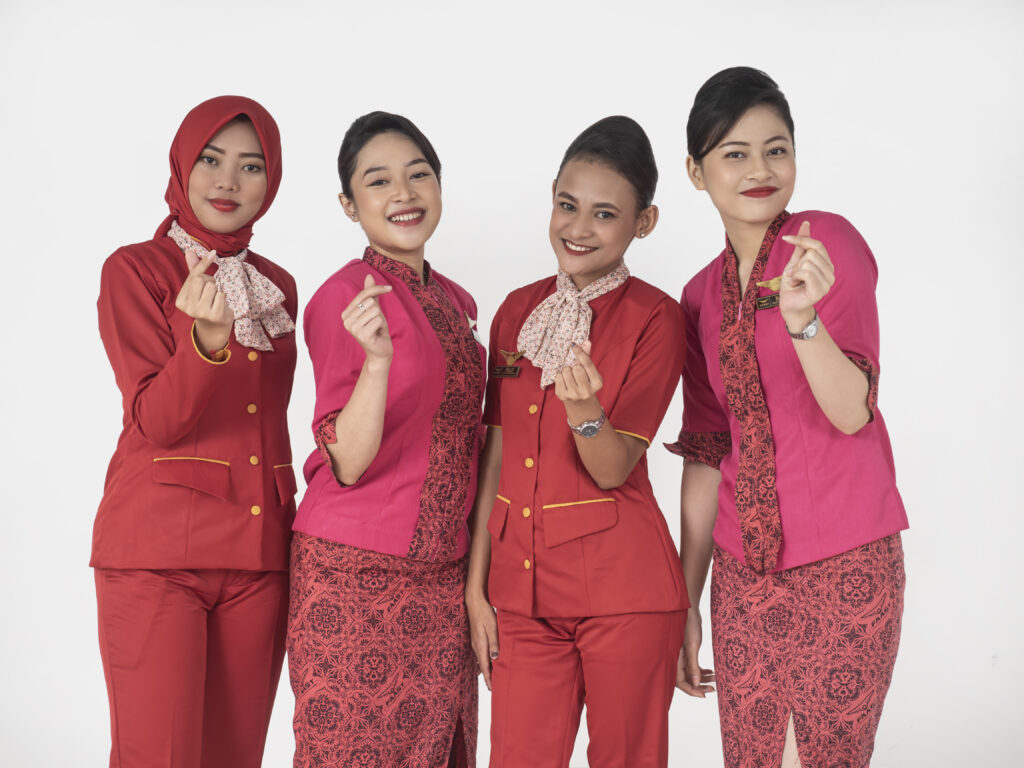



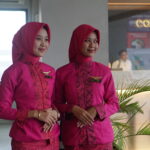
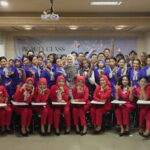
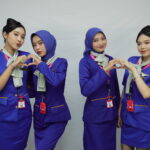

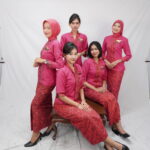
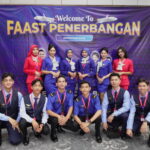


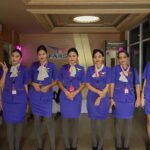
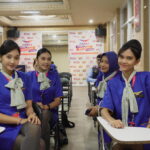



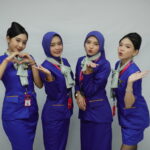
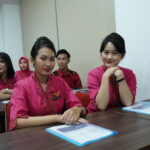
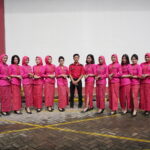

Leave a Reply